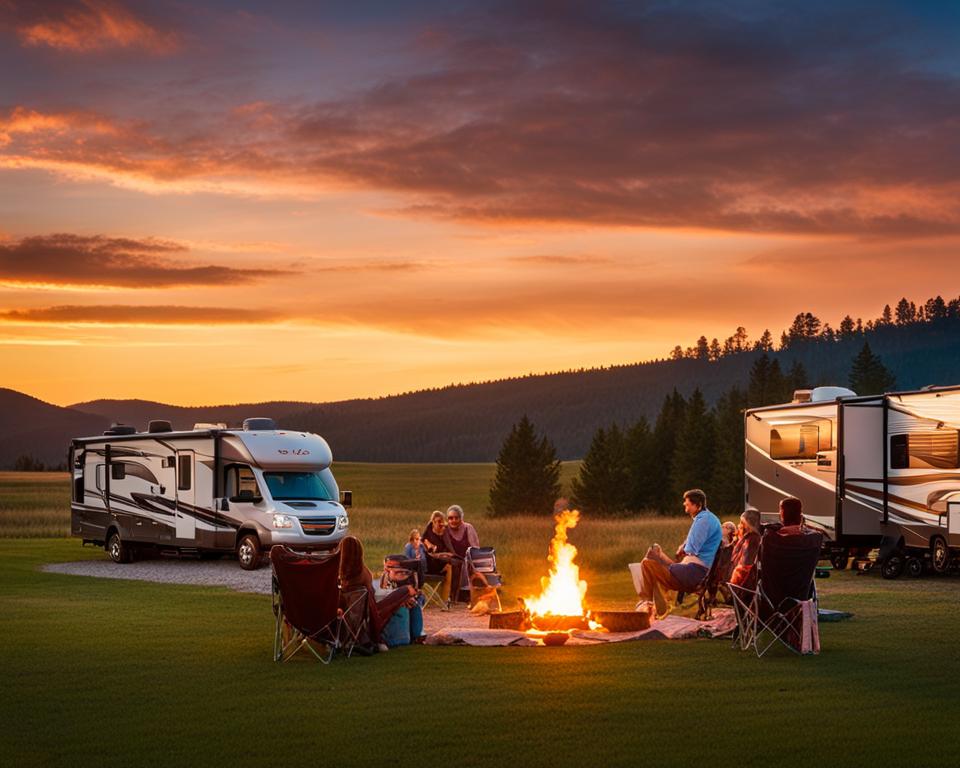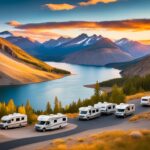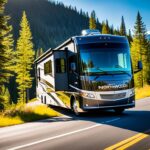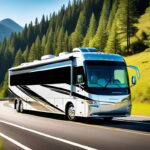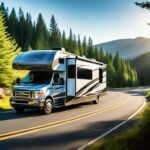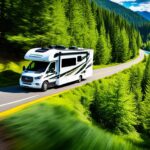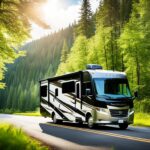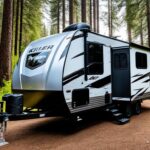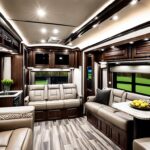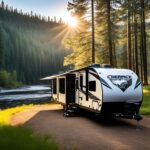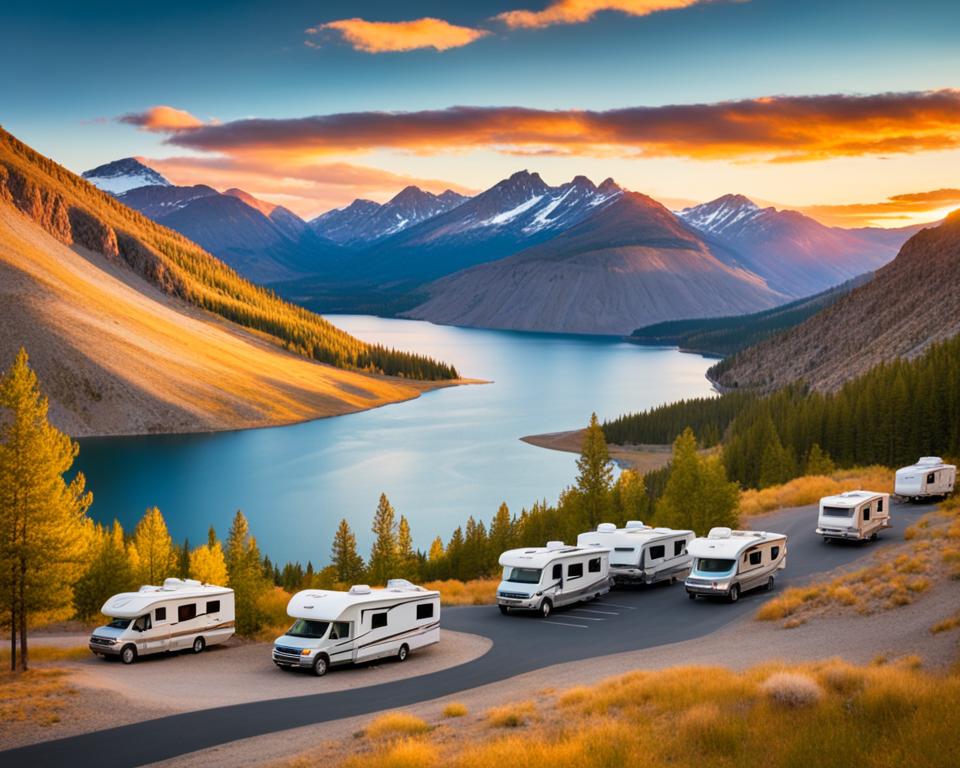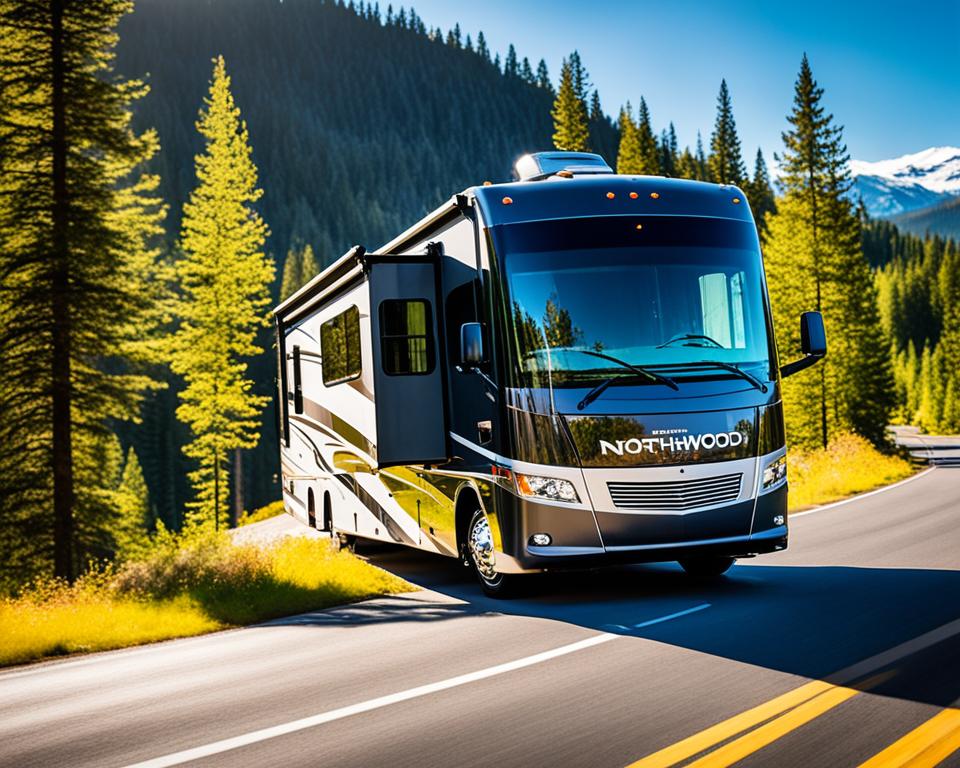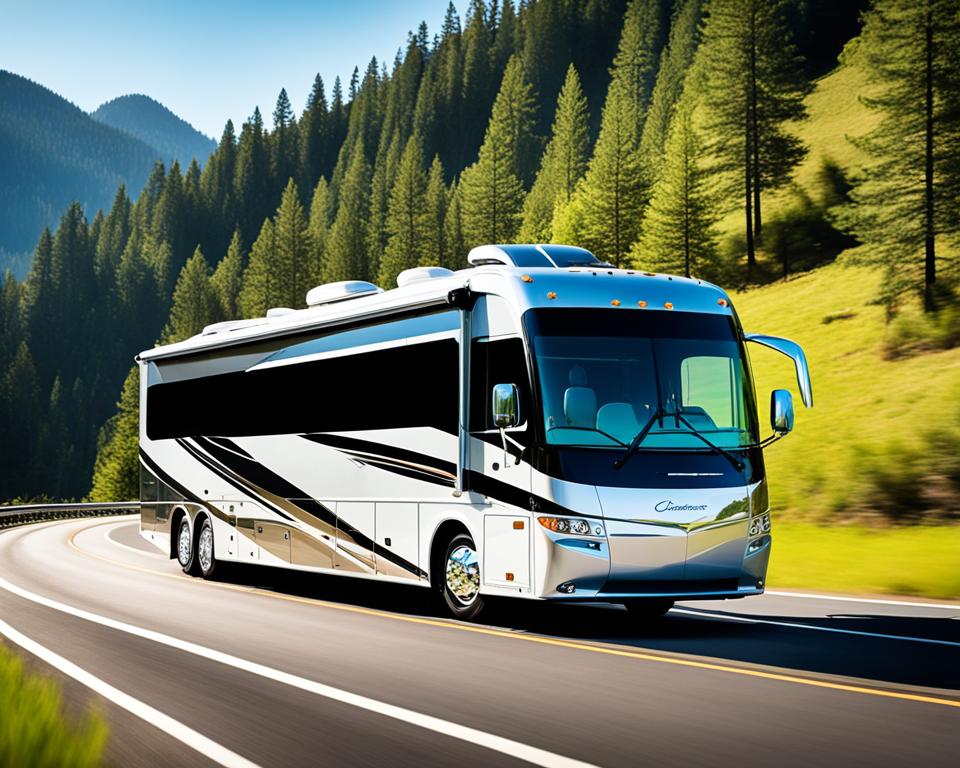Considering buying a recreational vehicle (RV)? It’s a big decision that requires careful consideration. Before diving into the world of RV ownership, it’s important to understand your options and what factors to consider when making your purchase.
An RV can be a long-term, adventurous investment that opens up a world of travel and exploration. But it’s not right for everyone. To determine if an RV is the right choice for you, think about the purpose of buying one, the traveler or owner, preferred destinations, towing or driving preferences, and the essential features you desire.
Once you’ve assessed your needs and preferences, you can start exploring the different types of RVs available. From motorhomes that you can drive, to towables that require a separate vehicle for towing, there’s a wide range of options to choose from. Each type offers unique features and benefits, so it’s important to research and choose the one that best suits your needs and comfort level.
Key Takeaways:
- Consider the purpose of buying an RV and the desired travel destinations.
- Decide between a motorhome or a towable based on towing or driving preferences.
- Research the different types of RVs available and choose one that suits your needs.
- Understand the additional expenses associated with RV ownership.
- Explore financing options and set a realistic budget before making a purchase.
Considerations for Buying an RV
When it comes to buying an RV, there are several important factors to consider. Understanding these considerations will help you make an informed decision that is tailored to your specific needs and preferences.
1. Purpose of the Purchase
First and foremost, think about the purpose of your RV purchase. Are you planning to use it for family vacations, weekend getaways, or full-time living? Determining the primary use of the RV will influence the size, features, and amenities that are most important to you.
2. Intended Traveler or Owner
Consider who will be using the RV the most. Are you buying it for yourself, your family, or a group of friends? Understanding the needs and preferences of the intended traveler or owner is essential in choosing the right RV model and layout.
3. Desired Travel Destinations
Think about the type of travel destinations you have in mind. Will you primarily be camping in national parks, exploring remote areas, or visiting RV resorts with full hookups? Knowing your desired travel destinations will help you determine the level of off-grid capability and the size of the RV that suits your needs.
4. Preference for Towing or Driving
Consider whether you prefer towing a trailer or driving a motorhome. Each option has its advantages and disadvantages. If you are comfortable towing and want the flexibility to disconnect your vehicle, a travel trailer may be the right choice. On the other hand, if you prefer the convenience of driving a self-contained unit, a motorhome may be more suitable.
5. Essential and Desired Features
Make a list of the essential features you need in an RV, such as the number of beds, bathroom facilities, kitchen amenities, and storage space. Additionally, consider any desired features that would enhance your RVing experience, such as slide-outs, entertainment systems, or outdoor cooking areas.
“Understanding these considerations will help you make an informed decision that is tailored to your specific needs and preferences.”
6. New or Used RV
Weigh the pros and cons of buying a new or used RV. A new RV offers the advantage of customizability, a manufacturer’s warranty, and the latest features and amenities. However, it tends to be more expensive. On the other hand, a used RV can save you money, but you may need to invest in repairs or upgrades.
7. Financing Options
Explore the financing options available to you. Dealers often offer financing options through various lenders, and you can also consider obtaining a loan from your bank or a third-party lender. Compare interest rates, terms, and down payment requirements to find the best financing option for your budget.
Here’s a table summarizing the key considerations for buying an RV:
| Considerations | Description |
|---|---|
| Purpose of the Purchase | Primary use of the RV |
| Intended Traveler or Owner | Needs and preferences of the user |
| Desired Travel Destinations | Type of campsites and locations |
| Preference for Towing or Driving | Towing a trailer or driving a motorhome |
| Essential and Desired Features | Must-have and nice-to-have features |
| New or Used RV | Pros and cons of each option |
| Financing Options | Available financing choices |
Considering these factors and exploring your options will help you make an educated decision when buying an RV. Whether you choose a new or used RV, financing through a dealer or a third-party, or prioritize certain features, the goal is to find the perfect RV that aligns with your needs and enhances your recreational adventures.
Types of RVs to Consider
When it comes to choosing the right recreational vehicle, there are various options available, each offering unique features and benefits. Whether you’re a seasoned traveler or a beginner, understanding the different types of RVs can help you make an informed decision. Here are some of the main categories to consider:
Motorhomes
- Class A: These luxurious motorhomes are often referred to as “bus-style” RVs and offer spacious interiors, high-end amenities, and plenty of storage space.
- Class B: Also known as camper vans, Class B motorhomes are compact and versatile, making them easy to drive and park in various locations.
- Class C: Class C motorhomes are larger than Class B but smaller than Class A. They usually feature a bed over the cab area and provide a comfortable living space.
Towables
- Travel Trailers: These RVs are towed by a separate vehicle and offer a wide range of sizes and floor plans to accommodate different needs. They are a popular choice for families and first-time RV owners.
- Fifth-Wheel RVs: Similar to travel trailers, fifth-wheel RVs are also towed by a separate vehicle. However, they attach to a specialized hitch in the bed of a pickup truck, providing additional stability and interior space.
It’s important to consider factors such as your travel preferences, desired amenities, and the size of your traveling party when choosing the right type of RV. Researching different brands and models, attending RV shows, and consulting with experienced RVers can also help you make an informed decision.
Buying a New RV
Buying a new RV is an exciting prospect for those looking to embark on memorable adventures. It offers the advantage of acquiring a brand new, top-of-the-line model with customizable options to suit individual needs and preferences. With a new RV, buyers can enjoy the peace of mind that comes with a full manufacturer warranty, knowing that there is no prior damage or wear and tear.
When considering a new RV purchase, it’s important to weigh the potential costs. The price of a new RV can vary depending on the desired features and customization options. However, investing in a new RV allows buyers to take advantage of the latest technology, improved fuel efficiency, and modern amenities.
Availability is another aspect to consider when buying a new RV. It’s essential to research and find a reputable recreational vehicle dealer who can provide the desired RV locally or arrange for it to be shipped if necessary. Working with a reliable dealer ensures a smooth and trustworthy buying experience.
| Advantages of Buying a New RV | Considerations for Buying a New RV |
|---|---|
| – Brand new, top-of-the-line model | – Higher price compared to used RVs |
| – Customizable options | – Possibility of higher insurance premiums |
| – Full manufacturer warranty | – Need to purchase a towing vehicle if not already owned |
Insurance premiums may be higher for new RVs due to their higher value. It’s essential to factor this into the budget and explore insurance options to ensure comprehensive coverage at a reasonable price.
For potential buyers who do not already have a suitable towing vehicle, purchasing one may be necessary. This additional consideration should be taken into account when determining the overall budget for buying a new RV.
Overall, buying a new RV provides the opportunity to start fresh with a dependable and fully-equipped vehicle that can provide years of enjoyment on the road. With the right dealer and careful consideration of costs, purchasing a new RV can be a worthwhile investment, ensuring a delightful and comfortable camping experience.
Buying a Used RV
Buying a used RV can be a great option for those looking to save money on their recreational vehicle purchase. It offers the opportunity to get an RV at a lower price compared to buying new. Buy RV For individuals who enjoy customization, a used RV can be a blank canvas to rebuild, redecorate, and restore to their liking. It allows for personalization and the creation of a unique living space on wheels.
However, there are a few factors to consider when buying a used RV. Since the vehicle has been previously owned, there may be some uncertainty about its condition and any hidden issues that may require repairs. It’s essential to take the time to thoroughly inspect the RV, both inside and out, and consider hiring a professional inspector if necessary. This will help ensure that you are aware of any potential problems and can negotiate a fair price based on the RV’s condition.
Another consideration when buying a used RV is the potential depreciation in value. As with any used vehicle, an RV’s value may decrease over time. It’s important to factor in this depreciation when determining the price you are willing to pay. Additionally, insurance costs for a used RV may be lower compared to a new RV, but the coverage may not include the same level of protection as a new RV with a manufacturer’s warranty. Consider your insurance needs and budget accordingly.
Lastly, it’s important to be prepared for any necessary upgrades or repairs. Since a used RV may have already seen some wear and tear, there may be a need for upgrades or repairs to improve its functionality, safety, or aesthetic appeal. These additional costs should be factored into your budget when considering the overall cost of the used RV.
Despite these considerations, buying a used RV can be a rewarding experience, allowing you to enjoy the RV lifestyle at a more affordable price point. By carefully inspecting the RV, considering depreciation, and planning for potential repairs or upgrades, you can make a smart investment and find the perfect used RV that meets your needs and budget.
Extra Expenses to Consider
In addition to the cost of buying an RV, there are several extra expenses that recreational vehicle buyers should take into account. These expenses can significantly impact the overall cost of RV ownership. Here are some crucial extra expenses to consider:
1. Insurance and GAP Coverage
Insuring your RV is essential for protecting your investment. RV insurance can help cover damages, theft, liability, and more. Additionally, GAP coverage provides financial protection in case your RV is stolen or totaled, and there is a difference between the remaining loan balance and the insurance settlement.
2. Maintenance and Repair Costs
Like any vehicle, RVs require regular maintenance and occasional repairs. It’s important to budget for routine services, such as oil changes and tire rotations, as well as unexpected repairs that may arise. Proper maintenance will help extend the life of your RV and ensure your safety on the road.
3. Insurance and Registration Fees
In addition to RV insurance, there are also registration fees that vary by state. These fees can include registration, title transfer, and license plate costs. It’s essential to research and understand the registering process in your specific state to avoid any surprises.
4. Fuel Costs
One major expense to consider is the cost of fuel for your RV. RVs are not known for their fuel efficiency, especially larger models. It’s important to calculate fuel costs based on the distance you plan to travel and the current fuel prices in different regions.
5. Utilities
Don’t forget about the cost of utilities when using your RV. Depending on your preferences and needs, you may want to budget for expenses like cable and internet services, water and electric hookups at campsites, and propane for cooking and heating.
6. Parking Fees
If you plan on staying at RV parks or campgrounds during your travels, it’s important to consider the cost of parking. Campground fees can vary significantly depending on the location, amenities, and time of year. Researching different campground options and their associated costs will help you plan your budget accordingly.
7. Meals and Food Preparation
Another expense to consider is the cost of meals and food preparation while on the road. Eating out frequently can quickly add up. Many RVers opt for cooking their own meals to save money. Budgeting for groceries and meal preparation equipment, like pots, pans, and a grill, will help you plan your food expenses more effectively.
Having a comprehensive understanding of these extra expenses will help you budget accordingly and ensure a smoother and more enjoyable RV ownership experience.
| Expense | Tips to Manage | |
|---|---|---|
| 1 | Insurance and GAP Coverage | Shop around for insurance quotes, compare different coverage options, and consider raising your deductible to lower your premium. Research GAP coverage and assess if it’s necessary based on your financial situation. |
| 2 | Maintenance and Repair Costs | Perform regular maintenance yourself when possible, learn basic repair skills, and consider joining RV owner communities for DIY tips and tricks. Create an emergency fund specifically for unexpected repairs. |
| 3 | Insurance and Registration Fees | Research the registration fees in your state and include them in your RV budget. Opt for a longer registration period, if available, to save on future renewal fees. |
| 4 | Fuel Costs | Plan your routes strategically to avoid unnecessary distances and utilize fuel-saving techniques such as maintaining a consistent speed and avoiding heavy acceleration. Consider joining loyalty programs for fuel discounts. |
| 5 | Utilities | Do your research and choose campgrounds that offer utilities at no or low additional cost. Invest in energy-efficient appliances and conserve resources whenever possible. |
| 6 | Parking Fees | Look for affordable campgrounds, consider boondocking or dry camping to save on parking fees, and take advantage of discounts available through RV clubs and memberships. |
| 7 | Meals and Food Preparation | Plan your meals in advance, buy groceries in bulk, and take advantage of local farmers’ markets for fresh and affordable produce. Bring reusable containers for leftovers to reduce waste. |
Financing Your RV Purchase
For those looking to purchase an RV, securing financing can be an excellent option to make ownership more affordable. RV dealers often provide financing options through different lenders, giving buyers the flexibility to explore various loan opportunities. Additionally, buyers can also seek vehicle loans directly from their banks or third-party lenders. However, the ability to secure financing depends on several factors, including credit score, down payment amount, and other financial considerations.
When considering financing options, buyers should be aware that choosing to finance through a dealer may offer competitive interest rates. On the other hand, financing through a third-party lender may result in higher interest rates due to the increased risk associated with RV loans. It’s important to carefully evaluate these interest rates and consider their impact on the overall affordability of the monthly payments.
One essential aspect to consider when financing an RV purchase is the possibility of early loan repayment. Some buyers may prefer to pay off their RV loan sooner to save on interest payments and avoid long-term financial commitments. However, it’s crucial to review the loan terms and any potential penalties for early repayment before making a final decision.
Ultimately, financing your RV purchase allows you to spread out the cost of ownership over time, making it more manageable. Whether you choose to finance through a dealer or explore loan options from other sources, carefully reviewing the terms, interest rates, and affordability of monthly payments is crucial to ensure a smooth and enjoyable RV ownership experience.
Financing an RV purchase can be an excellent way to make the dream of owning an RV a reality. Whether you decide to secure financing through a dealer or pursue a loan from another source, it’s important to carefully consider your financial situation and determine the best option for your needs. Once you’ve obtained financing, you’ll be one step closer to hitting the open road and enjoying all the adventures that await in your new RV.
Finding the Right RV For You
When it comes to finding the perfect recreational vehicle (RV), personal preferences, travel goals, and lifestyle play a crucial role. To make an informed decision, there are several factors to consider:
- Purpose of the RV: Determine how you plan to use the RV. Is it for weekend getaways, family vacations, or full-time living?
- Desired travel destinations: Consider the types of locations you want to visit. Are you more interested in camping in national parks, exploring coastal regions, or taking road trips across the country?
- Size and layout: Think about the number of people who will be traveling with you and the space you need for comfortable living. Consider the layout options, such as bunk beds or a kitchen island, that would enhance your RV experience.
- Available budget: Determine how much you are willing to spend on an RV. Explore both new and used options within your budget range.
Researching different RV brands and floorplans can help you narrow down your options. Reading online forums, attending RV shows, and joining RVing Facebook groups can provide valuable insights from experienced RVers.
Take the time to find an RV that best suits your needs and preferences. Remember, it’s an investment that should align with your lifestyle and goals.
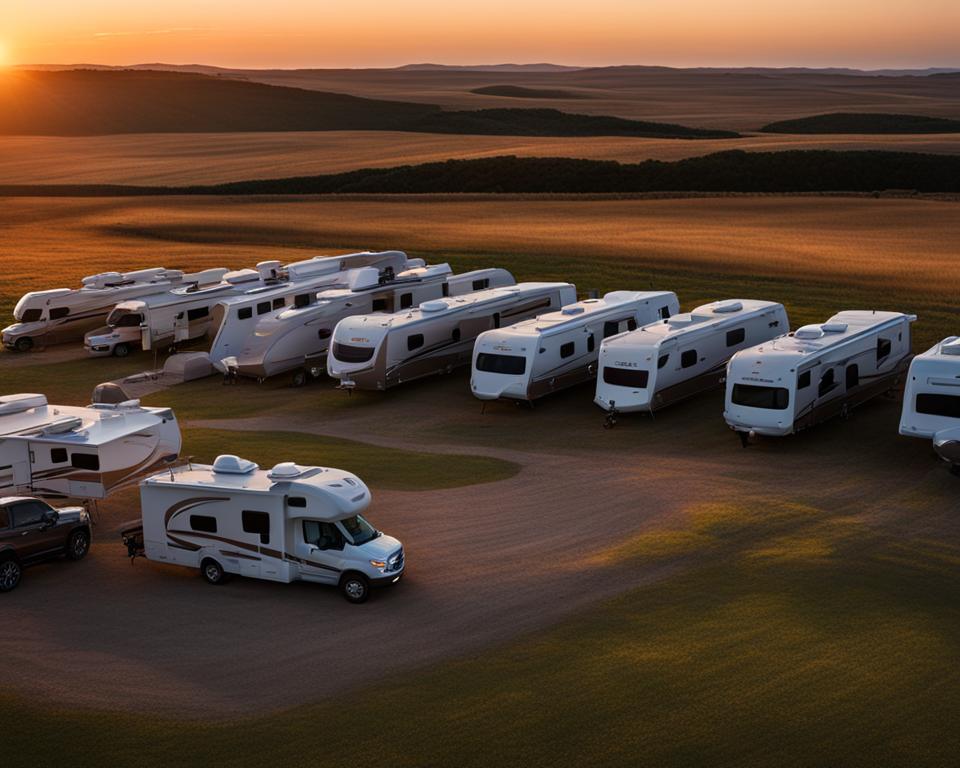
Budgeting for an RV
When it comes to buying an RV, budgeting is a crucial step in the planning process. Determining the total cost of ownership will help you make an informed decision and find an RV that aligns with your financial goals and capabilities.
Evaluating the Costs
Take into account all the expenses associated with owning an RV, including:
- Purchase price
- Financing
- Insurance
- Maintenance and repairs
- Fuel
- Utilities
Consider both one-time costs and recurring expenses to get a comprehensive understanding of the overall financial commitment.
Setting a Realistic Budget
Establishing a realistic budget is essential. It’s crucial to consider your personal financial circumstances and affordability. Take into account your income, savings, and other financial obligations to determine how much you can comfortably spend on an RV.
Keep in mind the potential impact of monthly payments on your budget and assess the possibility of paying off the RV loan early. By setting a clear budget, you can narrow down your options and focus on finding an RV that suits your needs without straining your finances.
Planning for Extra Expenses
Remember that your budget should also account for additional expenses beyond the purchase price and financing. These may include camping or parking fees, storage costs, RV accessories, and any necessary upgrades or modifications.
Staying Flexible
Being flexible with your budget can be beneficial. It’s a good idea to set aside some contingency funds for unexpected expenses that may arise during the ownership of your RV. Having a buffer will provide peace of mind and prevent financial strain in case of unexpected repairs or emergencies.
| Expense | Cost Range |
|---|---|
| Purchase Price | $10,000 – $500,000+ |
| Financing | $200 – $1,500/month |
| Insurance | $500 – $2,000/year |
| Maintenance and Repairs | Varies depending on RV age and condition |
| Fuel | $2.50 – $4.00/gallon |
| Utilities | $100 – $300/month |
These figures are just estimates and can vary based on various factors such as the type and size of the RV, usage, location, and personal preferences.
By taking the time to budget properly, you’ll have a better understanding of what you can afford and be well-prepared for the financial responsibilities that come with RV ownership.
Tips for Negotiating a Better Price on an RV
When it comes to buying an RV, negotiating the price can lead to significant savings. Here are some tips to help you secure a better deal:
- Keep your options open: Research different RV models and dealers to have a range of choices.
- Monitor finance rates: Stay updated on current interest rates to make informed financial decisions.
- Be patient for the right deal: Don’t rush into a purchase; wait for the perfect opportunity and price.
- Attend RV shows: These events often have special discounts and offers for potential buyers.
- Time your purchase: Consider buying at the end of the RV season or month when dealers may be more willing to negotiate.
- Build a friendly rapport: Establishing a good relationship with the salesperson may lead to better negotiations.
- Take risks in negotiations: Don’t be afraid to make counteroffers or ask for additional perks.
- Explore incentives: Inquire about rebates, extended warranties, or other incentives that can lower the overall price.
To negotiate effectively, it’s essential to have knowledge of the RV market and comparable prices. By employing these strategies, you increase your chances of getting the best possible price on your recreational vehicle purchase.
Price Negotiation Tips
| Negotiation Tips | Description |
|---|---|
| Keep your options open | Research different RV models and dealers to have a range of choices. |
| Monitor finance rates | Stay updated on current interest rates to make informed financial decisions. |
| Be patient for the right deal | Don’t rush into a purchase; wait for the perfect opportunity and price. |
| Attend RV shows | These events often have special discounts and offers for potential buyers. |
| Time your purchase | Consider buying at the end of the RV season or month when dealers may be more willing to negotiate. |
| Build a friendly rapport | Establishing a good relationship with the salesperson may lead to better negotiations. |
| Take risks in negotiations | Don’t be afraid to make counteroffers or ask for additional perks. |
| Explore incentives | Inquire about rebates, extended warranties, or other incentives that can lower the overall price. |
The Realities of RVing
RVing offers a wide range of experiences that can make every journey memorable. From savoring a cup of campfire coffee in the morning to falling asleep under a breathtaking starry sky at night, the adventures that await are truly awe-inspiring. However, it’s important to be aware of the practical realities of RVing to ensure a smooth and enjoyable experience.
One of the key aspects of RVing is mapping out your campground destinations. Whether you prefer secluded spots amidst nature or bustling RV parks with amenities, careful planning will help you find the perfect spots for your desired experiences. Researching and booking campground reservations in advance can prevent last-minute disappointments and ensure availability.
Another practical consideration is the regular maintenance and care required for your RV. Emptying tanks, cleaning and sanitizing, and keeping up with routine checks are all essential tasks to keep your recreational vehicle in top shape. Regular maintenance will help prevent untimely breakdowns and ensure a safe and hassle-free journey.
“RVing can be a rewarding way to make new memories and explore the world, but it requires planning, organization, and adaptability.”
Flexibility and adaptability are key characteristics of any successful RV journey. Unexpected changes in weather, road closures, or campground availability may require adjustments to your plans. Being flexible and open to alternative routes or destinations will allow you to make the most of any situation and embrace the adventurous spirit of RVing.
Understanding the responsibilities and realities of RVing before making a purchase is crucial. It’s important to have realistic expectations and be prepared for the various aspects of RV ownership. By considering the practicalities of mapping campgrounds, performing regular maintenance, and staying adaptable, you can maximize the joy of RVing and create unforgettable memories.
Conclusion
Embarking on an RV purchase is an exhilarating endeavor that promises the freedom to explore and travel in ultimate comfort. However, it is crucial to approach this decision with careful consideration of personal preferences, travel goals, and financial capabilities. A comprehensive understanding of the different types of RVs available, along with the pros and cons of buying new or used, will equip buyers to make informed choices. Exploring the various financing options and being aware of the extra expenses associated with RV ownership is also essential.
By engaging in thorough planning and diligent research, individuals can find the best recreational vehicle that aligns with their aspirations. Taking into account factors such as desired features, budget constraints, and potential travel destinations will ensure that the chosen RV caters to both immediate needs and long-term dreams. Remember, knowledge is key when it comes to purchasing an RV, and armed with the right information, buyers can confidently embark on their nomadic adventures.
In the end, finding the perfect recreational vehicle requires patience, careful consideration, and a clear understanding of personal requirements. Whether seeking a motorhome or a towable, a new or used model, diligent buyers who prioritize thoughtful decision-making will be rewarded with an RV that enhances their travel experiences, creates lasting memories, and opens the door to endless adventures.
FAQ
What factors should I consider when buying an RV?
When buying an RV, it’s important to consider the purpose of the purchase, the intended traveler or owner, the desired travel destinations, the preference for towing or driving, and the essential and desired features.
Should I buy a new or used RV?
The decision between a new or used RV depends on factors such as budget, customization options, warranty coverage, and potential maintenance and repair costs.
What types of RVs are available?
Motorhomes, including Class A, Class B, and Class C, and towables, such as travel trailers and fifth-wheel RVs, are the main types of RVs to consider.
What are the advantages of buying a new RV?
Buying a new RV offers the advantage of getting a brand new, top-of-the-line model with customizable options and a manufacturer’s warranty.
What are the advantages of buying a used RV?
Buying a used RV can offer significant cost savings and the opportunity to customize and restore the RV to the buyer’s liking.
What extra expenses should I consider when buying an RV?
Extra expenses to consider include insurance, maintenance and repair costs, fuel, utilities, parking fees, and meal preparation expenses.
What are the financing options for purchasing an RV?
Financing options include dealer financing and third-party loans from banks or other lenders.
How can I find the right RV for me?
To find the right RV, consider your personal preferences, travel goals, budget, and research different RV brands and floorplans.
How should I budget for an RV?
Determine the total cost of ownership, including the purchase price, financing, insurance, maintenance, repairs, and ongoing expenses, to establish a realistic budget.
What tips can help me negotiate a better price on an RV?
Tips for successful negotiations include keeping options open, monitoring finance rates, attending RV shows, and building a friendly rapport with the salesperson.
What should I know about the realities of RVing?
RVing requires planning, organization, and adaptability, including mapping out campgrounds, emptying tanks, and regular maintenance.
Is buying an RV a good investment?
Buying an RV is a long-term, adventurous investment that offers the freedom to explore and travel in comfort.

